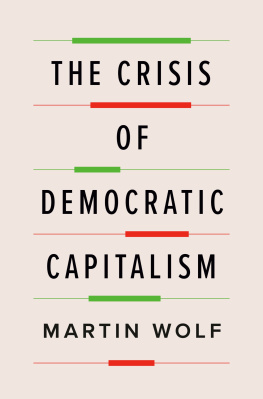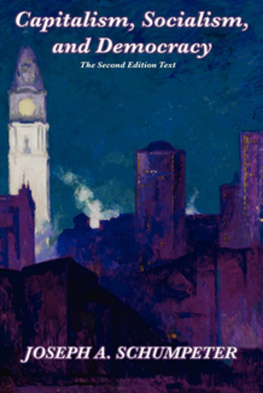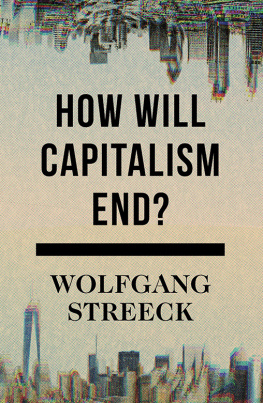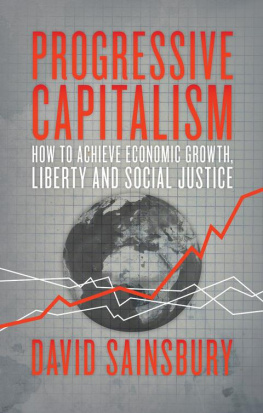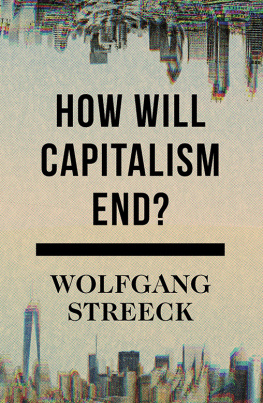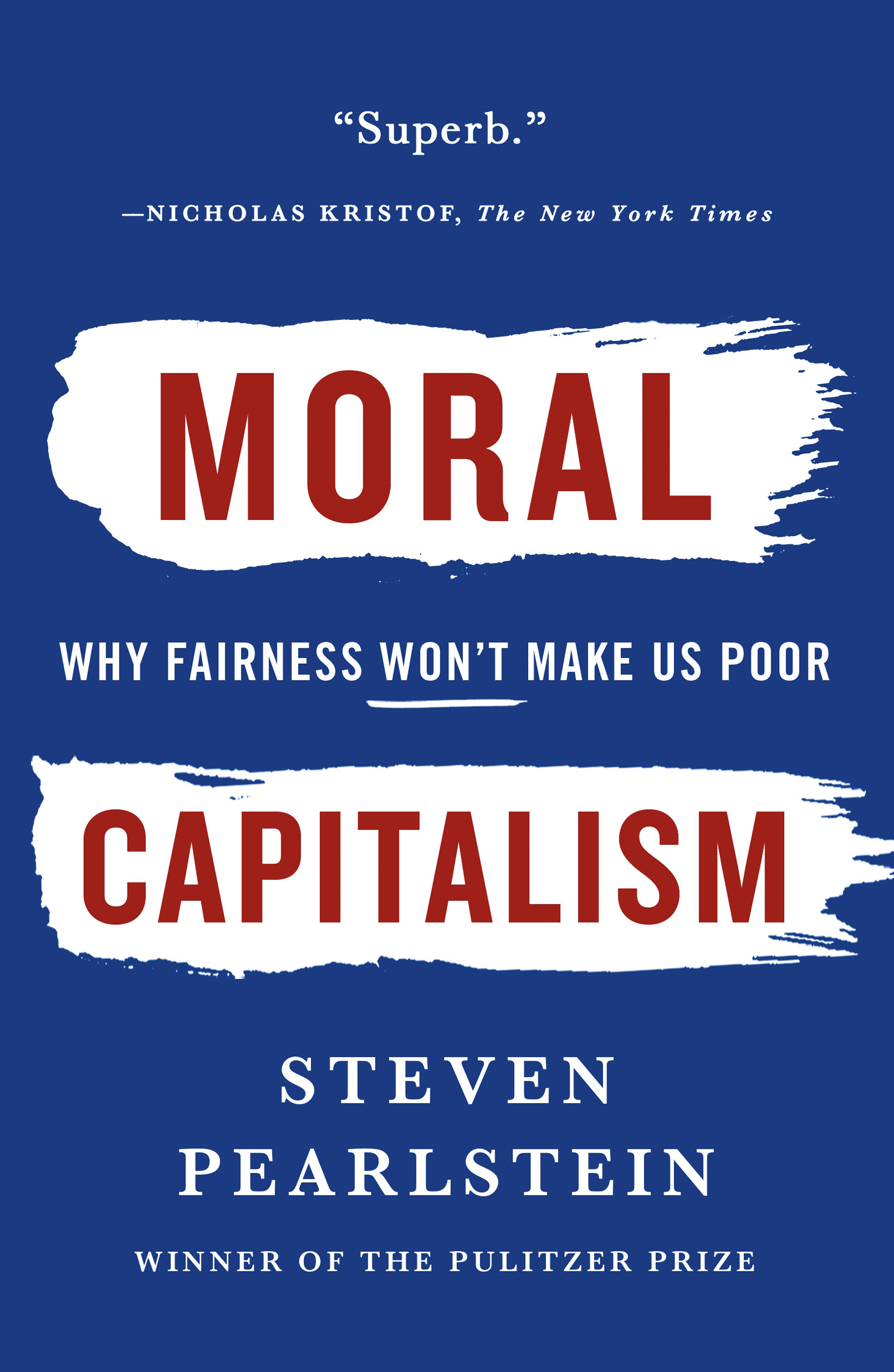Contents
Guide
Pagebreaks of the print version

The author and publisher have provided this e-book to you for your personal use only. You may not make this e-book publicly available in any way. Copyright infringement is against the law. If you believe the copy of this e-book you are reading infringes on the authors copyright, please notify the publisher at: us.macmillanusa.com/piracy.
For Wendy
Who Made Everything Possible
Introduction
to the Paperback Edition
For former Colorado governor and Democratic presidential candidate John Hickenlooper, it should have been a soft pitch at the letters, one easily knocked out of the park. Appearing on MSNBCs highly rated Morning Joe program, the successful brew-pub-owner-turned-politician was asked if he considered himself a proud capitalist. But rather than embrace hisand his countrysentrepreneurial roots, Hickenlooper dissembled, desperate to avoid offending the growing army of liberal party activists for whom capitalism has suddenly become a dirty word. Shocked by the candidates nonresponse, host Joe Scarborough invited him a second time to affirm his capitalist leanings, and then a third, and twice more the candidate demurred. His candidacy never quite recovered.
When a moderate, pro-business Democrat running to be president of the United States refuses to endorse capitalism, you know something fundamental has changed. For all his rhetorical bumbling, what Hickenlooper had come to understand is that the economic system and business culture that had made the United States the worlds richest and most powerful country was now viewed by a growing number of Americans as ruthless, unfair and morally corrupting.
This disenchantment has already energized an army of camp followers for avowedly socialist politicians like Bernie Sanders of Vermont and Alexandria Ocasio-Cortez, the influential new congresswoman from Brooklyn, who tells anyone who listens that capitalism is irredeemable and unsustainable, and whose top adviser famously declared every billionaire to be a policy failure. Almost overnight, ideas such as wealth taxes, guaranteed jobs, national health insurance and debt-free college have moved from the fringes of the policy debate to the red-hot center. More Democrats and Democratic-leaning voters now have a positive view of socialism (57 percent) than capitalism (47 percent). Among younger voters, the gap is even wider.
And it is not just politicians who have noticed the change in the zeitgeist. So have captains of business and finance, who have begun to worry publicly that unless something is done to reform capitalism and make it work for more Americans, more radical fixes will be thrust upon them.
For several years, for example, Larry Fink, the chief executive of BlackRock, which manages and invests more of the worlds savings than any company on the planet, has written to the chief executives of all the countrys large public companies to warn them to demonstrate that their companies serve a larger social purpose than enriching shareholders and executives. Ray Dalio, the billionaire founder of the worlds largest hedge fund, recently penned a two-part manifesto warning of revolution unless American capitalism is reengineered to do as good a job at dividing the economic pie as it now does growing it. And in his 2019 letter to shareholders, Jamie Dimon, the chief executive of JPMorgan Chase, the countrys largest bank, felt the need to come to the defense of capitalism while acknowledging that the social needs of far too many of our citizens are not being met.
Amid all this angst, its easy to forget that it was only 25 years ago that the world was celebrating the triumph of American capitalism. After a long cold war, communism had been vanquished and discredited, with China, Russia and Eastern Europe seemingly rushing to embrace the market system. American capitalism had widened its economic lead over European-style socialism while the once-unstoppable export machine, Japan Inc., had finally hit a wall. Developing countries such as India, Brazil and Russia were moving to embrace the Washington consensus of privatization, deregulation and free trade. Around the world, this embrace of market capitalism would lift more than a billion people from poverty.
In recent years, however, confidence in the superiority of the American system has been badly eroded. A global financial crisis that started in Asia and spread to Russia and Latin America shattered the Washington consensus. Americans have lived through the bursting of two financial bubbles, struggled through two serious recessions and toiled through several decades in which almost all of the benefits of economic growth have been captured by the richest 10 percent of households. A series of accounting and financial scandals, a massive government bailout of the banking system, the inexorable rise in pay for corporate executives, bankers and hedge fund managersall of these have generated widespread resentment and cynicism. While some have prospered, many others have been left behind.
Part of this disquiet has to do with the market systems inability to continue delivering a steadily rising standard of living to the average household, as it had for the previous half century. In the 15-year period from 1953 to 1968, the inflation-adjusted income of the median American family increased by 54 percent. In the 15-year period from 2001 to 2016, the increase was just 4 percent. No wonder that just 37 percent of Americans now believe they will do better financially than their parents, the driving idea behind the American Dream.
But another part of our disquiet reflects a nagging suspicion that our economic system has run off the moral rails, offending our sense of fairness, eroding our sense of community, poisoning our politics and rewarding values that easily degenerate into greed and indifference. The qualities that once made America greatthe optimism, the commitment to equality, the delicate balance between public and private, the sense that were all in this togetherno longer apply.
It has got to the point that we are no longer surprised when employees of a major bank sign up millions of customers for credit cards and insurance they didnt want or even know about, just to make their monthly numbers.
We are reluctantly reconciled to a system that lavishes $800 million in compensation a yearthats $250,000 an houron the head of a private equity firm simply for being clever about buying and selling companies with other peoples money.
We are now barely shocked when a company tells longtime workers that their jobs are being sent overseas and that they will get a modest severancebut only if they train the foreign workers who will be taking their jobs.
We are both outraged and resigned when yet another corporation renounces its American citizenship just to avoid paying its fair share of taxes to the government that educates its workers, protects its property and builds the infrastructure by which it gets its products to market.
While we may have become desensitized to these individual stories, however, collectively they color the way we think about American capitalism. In less than a generation, what was once considered the optimal system for organizing economic activity is now widely viewed, at home and abroad, as having betrayed its ideals and its purpose and forfeited its moral legitimacy. We seek a new, more moral capitalism.
* * *
To understand how we got to this point, we have to travel back to the mid-1970s. After decades of dominating U.S. and foreign markets, many of Americas biggest and most successful corporations had become complacent and lost their competitive edge. They were less efficient, less innovative and less willing to take risk. Excessive government regulation had raised costs and sapped the dynamism of sectors such as transportation, communication, finance and energy, with government officials dictating which companies could compete, what services they could provide, what prices they could charge and what profits they could earn. Overzealous antitrust enforcement had prevented mergers among rivals that would have allowed them to achieve economies of scale. Unions had pushed wages and benefits to unsustainable levels, driving up prices and draining companies of the capital needed for investment and modernization. Loose interest-rate policy at the Federal Reserve and overspending by Congress had triggered double-digit inflation.


